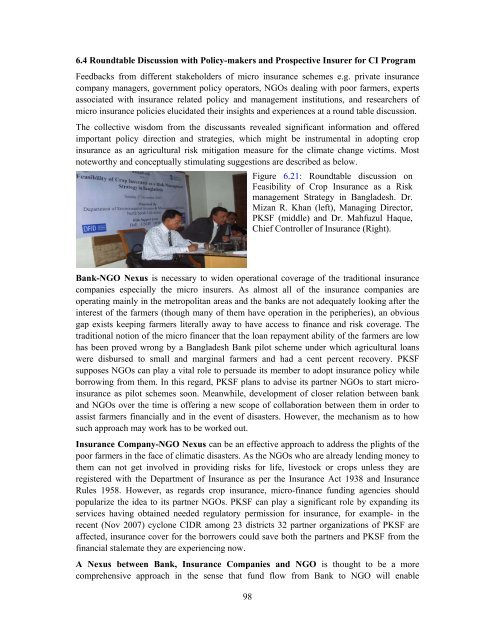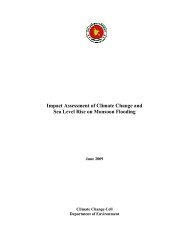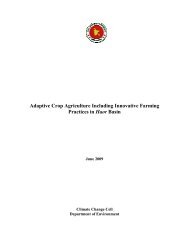Crop Insurance as a Risk Management Strategy in Bangladesh
Crop Insurance as a Risk Management Strategy in Bangladesh
Crop Insurance as a Risk Management Strategy in Bangladesh
Create successful ePaper yourself
Turn your PDF publications into a flip-book with our unique Google optimized e-Paper software.
6.4 Roundtable Discussion with Policy-makers and Prospective Insurer for CI Program<br />
Feedbacks from different stakeholders of micro <strong>in</strong>surance schemes e.g. private <strong>in</strong>surance<br />
company managers, government policy operators, NGOs deal<strong>in</strong>g with poor farmers, experts<br />
<strong>as</strong>sociated with <strong>in</strong>surance related policy and management <strong>in</strong>stitutions, and researchers of<br />
micro <strong>in</strong>surance policies elucidated their <strong>in</strong>sights and experiences at a round table discussion.<br />
The collective wisdom from the discussants revealed significant <strong>in</strong>formation and offered<br />
important policy direction and strategies, which might be <strong>in</strong>strumental <strong>in</strong> adopt<strong>in</strong>g crop<br />
<strong>in</strong>surance <strong>as</strong> an agricultural risk mitigation me<strong>as</strong>ure for the climate change victims. Most<br />
noteworthy and conceptually stimulat<strong>in</strong>g suggestions are described <strong>as</strong> below.<br />
Figure 6.21: Roundtable discussion on<br />
Fe<strong>as</strong>ibility of <strong>Crop</strong> <strong>Insurance</strong> <strong>as</strong> a <strong>Risk</strong><br />
management <strong>Strategy</strong> <strong>in</strong> <strong>Bangladesh</strong>. Dr.<br />
Mizan R. Khan (left), Manag<strong>in</strong>g Director,<br />
PKSF (middle) and Dr. Mahfuzul Haque,<br />
Chief Controller of <strong>Insurance</strong> (Right).<br />
Bank-NGO Nexus is necessary to widen operational coverage of the traditional <strong>in</strong>surance<br />
companies especially the micro <strong>in</strong>surers. As almost all of the <strong>in</strong>surance companies are<br />
operat<strong>in</strong>g ma<strong>in</strong>ly <strong>in</strong> the metropolitan are<strong>as</strong> and the banks are not adequately look<strong>in</strong>g after the<br />
<strong>in</strong>terest of the farmers (though many of them have operation <strong>in</strong> the peripheries), an obvious<br />
gap exists keep<strong>in</strong>g farmers literally away to have access to f<strong>in</strong>ance and risk coverage. The<br />
traditional notion of the micro f<strong>in</strong>ancer that the loan repayment ability of the farmers are low<br />
h<strong>as</strong> been proved wrong by a <strong>Bangladesh</strong> Bank pilot scheme under which agricultural loans<br />
were disbursed to small and marg<strong>in</strong>al farmers and had a cent percent recovery. PKSF<br />
supposes NGOs can play a vital role to persuade its member to adopt <strong>in</strong>surance policy while<br />
borrow<strong>in</strong>g from them. In this regard, PKSF plans to advise its partner NGOs to start micro-<br />
<strong>in</strong>surance <strong>as</strong> pilot schemes soon. Meanwhile, development of closer relation between bank<br />
and NGOs over the time is offer<strong>in</strong>g a new scope of collaboration between them <strong>in</strong> order to<br />
<strong>as</strong>sist farmers f<strong>in</strong>ancially and <strong>in</strong> the event of dis<strong>as</strong>ters. However, the mechanism <strong>as</strong> to how<br />
such approach may work h<strong>as</strong> to be worked out.<br />
<strong>Insurance</strong> Company-NGO Nexus can be an effective approach to address the plights of the<br />
poor farmers <strong>in</strong> the face of climatic dis<strong>as</strong>ters. As the NGOs who are already lend<strong>in</strong>g money to<br />
them can not get <strong>in</strong>volved <strong>in</strong> provid<strong>in</strong>g risks for life, livestock or crops unless they are<br />
registered with the Department of <strong>Insurance</strong> <strong>as</strong> per the <strong>Insurance</strong> Act 1938 and <strong>Insurance</strong><br />
Rules 1958. However, <strong>as</strong> regards crop <strong>in</strong>surance, micro-f<strong>in</strong>ance fund<strong>in</strong>g agencies should<br />
popularize the idea to its partner NGOs. PKSF can play a significant role by expand<strong>in</strong>g its<br />
services hav<strong>in</strong>g obta<strong>in</strong>ed needed regulatory permission for <strong>in</strong>surance, for example- <strong>in</strong> the<br />
recent (Nov 2007) cyclone CIDR among 23 districts 32 partner organizations of PKSF are<br />
affected, <strong>in</strong>surance cover for the borrowers could save both the partners and PKSF from the<br />
f<strong>in</strong>ancial stalemate they are experienc<strong>in</strong>g now.<br />
A Nexus between Bank, <strong>Insurance</strong> Companies and NGO is thought to be a more<br />
comprehensive approach <strong>in</strong> the sense that fund flow from Bank to NGO will enable<br />
98





